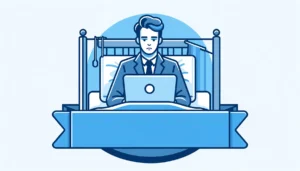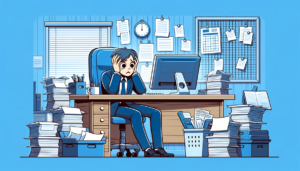Managing workplace stress: soft skills or survival skills?
- 6 Min Read
The skills we often refer to as ‘soft’ are in fact that survival skills we need to thrive and avoid burnout in the workplace. Vikki Pratley, StressLess Coach, gives you the toolkit to strengthen your survival skills.
- Author: Vikki Pratley
- Date published: Dec 3, 2019
- Categories

It was 2 minutes after noon on the 9th of November 2017 and I felt as though I’d been punched in the gut. I put down the telephone, drooped forward, and sobbed.
It was another huge step in realizing I had a problem. A medical problem. I wasn’t well. And the HR partner of the accountancy practice where I’d set up a law firm thought so too.
I was suffering from burnout.
Why does this matter to you?
Mental health issues cost UK employers up to £42billion per year through presenteeism (£17-26 billion), absence (£8 billion) and employee turnover (£8 billion). And I cost my business the equivalent of 15 month’s salary as my journey took me through each of these three stages, identified by Deloitte in their Mental Health and Wellbeing review.
If your team is, like many, tasked with supporting the business in 2020 to grow in profit and turnover, then making a financial impact through reducing the mental health cost burden will take you towards that target. Actually, it gets better than that! Deloitte quantify that to invest in your people when they are thriving will gain you more than eight times return on that investment. Getting £800 back for every £100 spent on an employee are probably unbeatable odds in today’s climate!
When we talk about poor mental health…
… we are discussing a huge spectrum of health issues. But did you know, at the center of the Mental Health Foundation’s work is the belief that many mental health problems are preventable? Burnout is one.
Burnout is a mental illness that the World Health Organisation (the “WHO”) added to its International Classification of Diseases this year as being characterized by:
- Feelings of energy depletion or exhaustion
- Increased mental distance from one’s job
- Reduced professional efficacy
For me, burnout took me from being a happy, engaged, hard working team player to being negative, withdrawn and short tempered. Having once loved life and thrived on challenge, every day became as hard as wading through a big vat of treacle with a woolly head, like when you are coming down with a cold. Needless to say this negatively impacted my output despite working longer hours.
The WHO defined burnout as a syndrome caused by ‘chronic workplace stress that is not successfully managed’. Thereby categorizing it as a preventable mental health condition; with which I agree based on my experience.
So how can we successfully manage workplace stress and avoid burnout?
Through my recovery I had some tough moments realizing where I had gone wrong as an individual. And some sad moments realizing how the environment I was in negatively contributed to my burnout. Therefore it is for organisations and individuals to take equal responsibility for the maintenance of our mental fitness.
The Stevenson/Farmer Review’s mental health core standards provides a good framework for organisations to take action. But you wouldn’t be blamed for still thinking ‘where do I start’. So I like to start with our mindset.
Responsible initiative
As individuals, we can learn to take responsible initiative. This mindset is about taking responsibility for shaping our own environment. And we often have more influence than we first think.
Deadlines. Clients I work with through my StressLess Clinic often see deadlines as being out of their control and the source of immense stress. And, yes, that is sometimes the case. But even so, how we schedule and manage our priorities leading up to those deadlines is in our control. To take a moment to review and plan our priorities and control our workload is just one key skill for successfully managing our stress, which compliments this mindset.
Yet, for many of my clients, deadlines are self-imposed. They think that they must respond immediately or their boss/client/colleague will think [insert negative here] of them. When I was a practicing employment lawyer, the nature of my work meant that everything had a huge sense of urgency. I’d, however, project this sense of urgency onto myself and those around me even when it was not necessary, creating unrealistic expectations that were not sustainable.
Challenge: negotiate a deadline with a colleague two days later than you normally would. See what happens….
High Challenge/ High Support
The second mindset involves leading with an attitude of balancing high challenge and high support.
Organisations, like the one I was in, that have high challenge environments often do not balance that challenge with the right kind of support (and having lovely colleagues isn’t the type of support I am referring to). The result is breeding grounds for stress and for some, me included, burnout.
Instead, leaders with the high challenge/high support mindset can develop their team by challenging them whilst providing support that is equal to that challenge. Investing in developing a team member when they are, say, taking on a new project will take up more of your time. However, if you do this with the right balance of support and challenge you will not only prevent stress from becoming chronic but you will gain higher more sustainable and consistent performance from that individual.
Challenge: Ask yourself this question…
Allowing people to manage their own work…
- Over-burdens and often worries them
- Shows you trust them
- Is rewarding and confidence building when well supported
- Tries out abilities and capabilities
- Will let you see whether they have what it takes
If you have answered ‘C’, you are already on the road to having a balanced belief towards high support/high challenge as this demonstrates the underlying belief and attitude of this mindset.
Soft Skills or Survival Skills
These two mindsets may have inherited the unfortunate categorization of being ‘soft’ but are key for survival in today’s workplaces. Not only that, through successfully managing the chronic stress in many of today’s workplaces you will unlock the return of investment, which I mentioned earlier, and enable your team to thrive.
If you’d like to find out more about your and your team’s mindsets with regard to responsible initiative or high challenge/high support, contact me to carry out an online test and debrief.
After many years as a practicing employment lawyer and a founding partner of a successful law firm, Vikki suffered from burnout; recently recognized by the World Health Organisation as being caused by chronic workplace stress that is not successfully managed. Vikki was inspired to help others to be high performers without risking burnout so retrained as a coach and licensed practitioner and founded her business, Skylark.
Vikki now works with professionals, through speaking at events or on a one-to-one or group basis, to help them successfully manage workplace stress and create sustainably high performing environments. Vikki takes a holistic approach to her work, always starting with the individual before equipping them with a tool-kit for success including a mindset, key skills and, for leaders, a process.









